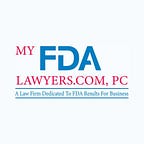Navigating the Maze: A Guide to FDA Regulations for Businesses
The world of food, drugs, medical devices, and cosmetics is stringently regulated to ensure consumer safety and product efficacy. The Food and Drug Administration (FDA) plays a vital role in this process, overseeing the development, manufacturing, labeling, and marketing of these products. For businesses operating in these sectors, navigating the complexities of FDA regulations can be daunting. This article provides a comprehensive guide to some key aspects you need to understand: FDA attorneys, consulting services, detentions, inspections, USDA permits (for applicable products), and FDA labeling requirements.
FDA Attorneys: Your Legal Champions
FDA regulations are vast and ever-evolving. An FDA attorney acts as your legal champion, ensuring compliance and advocating for your interests. These specialized lawyers possess in-depth knowledge of the FDA regulatory landscape, offering a range of services:
- Compliance Guidance: FDA attorneys advise on product development, labeling, marketing, and advertising to ensure adherence to regulations.
- Pre-market Approvals: They assist in navigating the complex process of obtaining FDA pre-market approvals for drugs, medical devices, and biologics.
- Inspections and Enforcement Actions: In the event of an FDA inspection or potential enforcement action, an attorney provides legal counsel and representation, protecting your rights and minimizing risks.
- Litigation: Should legal disputes arise concerning product liability or regulatory issues, FDA attorneys can represent you in court.
FDA Consulting Services: Streamlining Compliance
FDA consulting services offer valuable expertise to navigate the intricacies of FDA regulations. Consultants provide a range of services, including:
- Gap Analysis: They assess your current practices against FDA regulations, identifying areas for improvement and suggesting corrective actions.
- Quality Management Systems (QMS) Development: Consulting firms can assist in developing and implementing robust QMS to ensure consistent product quality and adherence to FDA standards.
- Regulatory Training: They offer training programs for your staff, educating them on FDA regulations specific to your industry.
- Labeling and Marketing Review: Consultants review product labels and marketing materials to ensure compliance with FDA labeling requirements and avoid misleading claims.
FDA Detentions: Understanding Imp holds
An FDA detention, also known as an “Import Alert,” occurs when the FDA detains imported products suspected of violating regulations. This can significantly delay your product’s entry into the U.S. market. Here’s what you need to know:
- Reasons for Detention: Common reasons for detention include mislabeling, adulteration, lack of pre-market approval, or failure to meet quality standards.
- The Detention Process: The FDA issues a detention notice outlining the violation and requesting corrective action. You have the option to re-export the product, bring it into compliance, or challenge the detention. An FDA attorney can guide you through this process.
- Preventing Detentions: Investing in compliance upfront, through proper labeling, quality control procedures, and pre-market consultations, can minimize the risk of detentions.
FDA Inspections: Preparing for Scrutiny
The FDA conducts routine inspections of facilities that manufacture, process, pack, hold, or distribute FDA Inspections. Here’s how to be prepared:
- Know the Regulations: Familiarize yourself with the regulations applicable to your product category.
- Develop a Compliance Plan: Implement a comprehensive compliance plan encompassing quality control procedures, record-keeping, and employee training.
- Conduct Mock Inspections: Practice inspections by conducting internal mock inspections to identify and address potential non-compliance issues.
- Cooperate with Inspectors: During an inspection, provide FDA investigators with access to requested information and facilities. An FDA attorney can advise you on your rights and obligations during the inspection process.
USDA Permits: A Consideration for Specific Products
While the FDA regulates a broad range of food and agricultural products, the United States Department of Agriculture (USDA) also plays a role in certain areas. For instance, meat, poultry, and egg products require USDA inspection and approval for processing and marketing. Businesses dealing with these products need to understand and comply with both FDA and USDA regulations.
FDA Label Requirements: Communicating Clearly with Consumers
FDA label requirements ensure accurate and non-misleading information is provided to consumers about the product. Key aspects of FDA labeling include:
- Identity: The label must clearly state the product’s name and identify the manufacturer, packer, or distributor.
- Ingredients: A complete and accurate list of ingredients must be declared, with major allergens prominently highlighted.
- Net Quantity: The label must accurately state the product’s quantity by weight, volume, or numerical count.
- Nutritional Facts Panel: For most food products, a nutritional facts panel details the product’s calorie content, nutrients, and dietary information.
